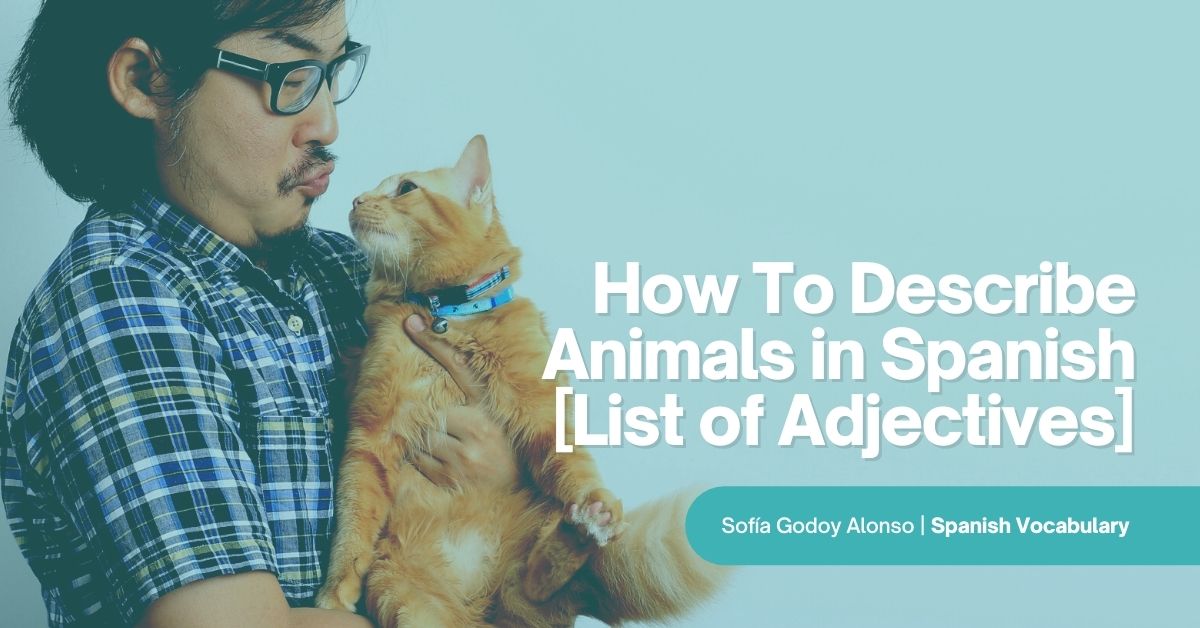
How To Describe Animals in Spanish [List of Adjectives]
Spanish adjectives to describe animals are just what you need to talk about your favorite furry friends and nature in general.
Animal lovers unite! Talking about your pet or those animals you love to admire is a powerful way of expanding your Spanish vocabulary. Learning Spanish adjectives is ideal for mastering descriptions in general of objects, places, and other living beings.
Animals have particular behaviors, unique physical traits, and come in different shapes and sizes. When you master these highly specific descriptions, you know you’re getting closer to Spanish fluency.
Start a conversation about your favorite, and not so favorite, critters with this complete list of adjectives, phrases, and words that describe animals in Spanish.
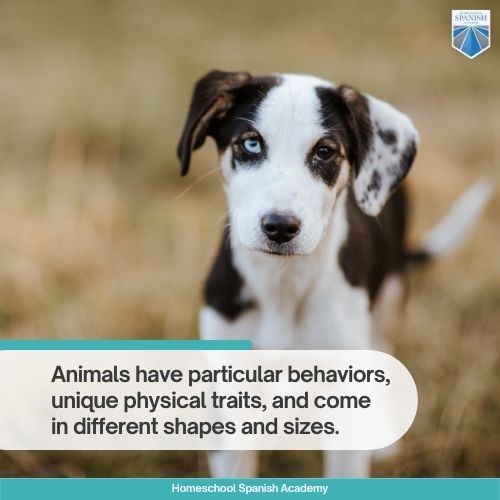
Spanish Adjectives To Describe Animals
The animal world is diverse and never-ending. It never ceases to amaze, especially because humanity continues to discover new species!
Talking in Spanish about appearance and behavior requires you to know plenty of descriptive words for animals.
Depending on the habitat and type of animal you’re describing, you’ll find there are a large variety of words you can use when it comes to adjectives to describe texture, words to describe skin, adjectives to describe colors or patterns, and words to describe size.
Let’s dive deep into each of these physical and appearance traits with new Spanish vocabulary and practical examples.
Skin and Texture Adjectives To Describe Animals
| English | Spanish |
| fluffy | esponjosa, esponjoso |
| coarse | áspera, áspero |
| greasy | grasienta, grasiento |
| glowy | resplandeciente |
| hairy, furry | peluda, peludo |
| leathery | cómo cuero |
| scabby | costrosa, costroso |
| scaly | escamosa, escamoso |
| sleek | lisa, liso |
| soft | suave |
| wrinkly | arrugada, arrugado |
| spiky, spiny | con púas |
| slimy | babosa, baboso |
| sticky | pegajosa, pegajoso |
| wooly | lanuda, lanudo |
Example Sentences
Mi cachorro es esponjoso.
My pup is fluffy.
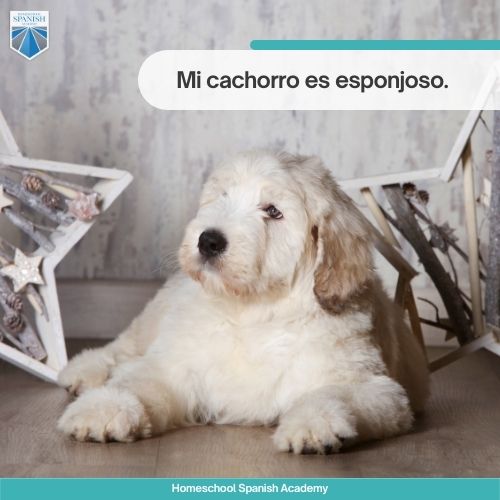
Los cocodrilos tienen la piel áspera.
Crocodiles have coarse skin.
Mi gato se metió bajo el carro y ahora está grasoso.
My cat snuck under the car and now he’s greasy.
Mi hámster es peludo.
My hamster is furry.
Los delfines tienen la piel como cuero.
Dolphins have leathery skin.
Los peces tienen la piel escamosa.
Fish have scaly skin.
La piel de las ballenas es lisa.
The skin of whales is sleek.
Los elefantes tienen la piel arrugada.
Elephants have wrinkly skin.
Algunas salamandras se sienten pegajosas, no me gusta tocarlas.
Some salamanders feel sticky, I don’t like touching them.
No me gustan los caracoles, tienen la piel babosa.
I don’t like snails, they have slimy skin.
Las ovejas son animales lanudos.
Sheep are shaggy animals.
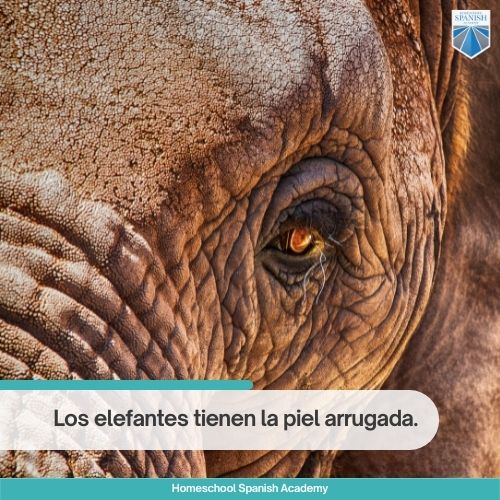
Color Adjectives To Describe Animals
| English | Spanish |
| bluish | azulada, azulado |
| bright | brillante |
| brindled, tabby | atigrada, atigrado |
| clear | clara, claro |
| dark | oscura, oscuro |
| fluorescent | fluorescente, fosforescente |
| ginger | rojiza, rojizo |
| iridescent | iridiscente |
| multicolored | multicolor |
| red | colorada, colorado |
| solid | lisa, liso |
| spotted | manchada, manchado |
| striped | rayada, rayado |
| transparent | transparente |
| tricolor | tricolor |
Example Sentences
Ese pájaro tiene plumas azuladas.
That bird has bluish feathers.
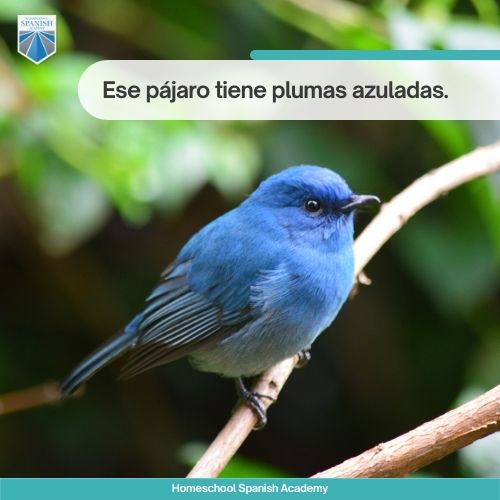
La serpiente tiene colores brillantes.
The snake has bright colors.
Mi perro es atigrado, tiene rayas parecidas a las de un felino.
My dog is a tabby, he has stripes similar to a feline.
El pez globo tiene colores claros.
The blowfish has clear colors.
Esa especie de murciélago es de color oscuro.
That species of bat is dark colored.
El plancton se ve fosforescente en la noche.
Plankton looks fluorescent at night.
Esa especie de panda tiene el pelo colorado.
That species of panda has red fur.
La serpiente es de color solido, no tiene rayas ni manchas.
The snake is a solid color, it doesn’t have stripes or spots.
Mi gatito es rayado.
My kitten is striped.
El leopardo de nieve es un animal manchado.
The snow leopard is a spotted animal.
La medusa que me pico es transparente.
The jellyfish that stung me is transparent.
La rana es multicolor.
The frog is multicolored.
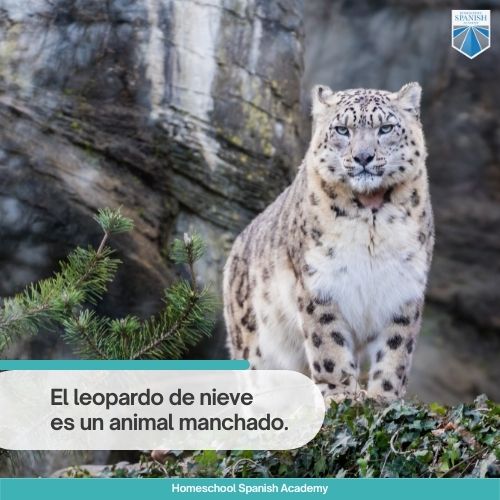
Did you know frogs are some of the most colorful critters in the animal kingdom? Learn all about frogs and their complex transformation in this activity-packed Vocabulary Guide to Amphibians in Spanish.
Size Adjectives To Describe Animals
| English | Spanish |
| big | grande |
| chubby | regordete |
| enormous | enorme |
| fat | gorda, gordo |
| giant | gigante |
| large | grande |
| microscopic | microscopica, microscopico |
| miniature | miniatura |
| overweight | con sobrepeso |
| short | baja, bajo |
| skinny | flaca, flaco |
| small | pequeña, pequeño |
| tall | alta, alto |
| thin | delgada, delgado |
| tiny | pequeñita, pequeñito |
Example Sentences
Los rottweilers son perros grandes.
Rottweilers are big dogs.
Este cachorro de oso es regordete, me encanta.
That bear cub is chubby, I love it.
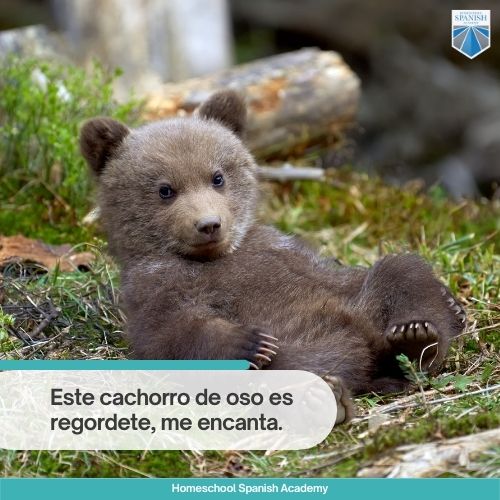
La ballena azul es un animal enorme.
The blue whale is an enormous animal.
Los cerdos adultos son usualmente gordos y grandes.
Adult pigs are usually fat and large.
Algunos parásitos son microscópicos.
Some parasites are microscopic.
Las hormigas son animales miniatura pero muy fuertes.
Ants are miniature animals but they’re very strong.
Estoy preocupada por mi perro porque está con sobrepeso.
I’m worried about my dog because he’s overweight
Los ponis son animales bajos.
Ponies are short animals.
La jirafa del zoológico es más alta de lo usual.
The giraffe from the zoo is taller than usual.
Me encantan los monos pequeñitos.
I love tiny monkeys.
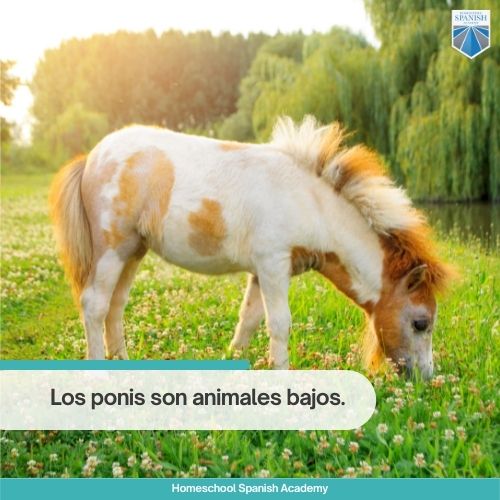
Other Adjectives To Describe Animals Part 1
| English | Spanish |
| adorable | adorable |
| agile | ágil |
| aggressive | agresiva, agresivo |
| carnivores | carnivora, carnivoro |
| creepy | espeluznante |
| cuddly | mimosa, mimoso |
| cute | tierna, tierno |
| dangerous | peligrosa, peligroso |
| fast | rapida, rapido |
| fierce | feroz |
| friendly | amigable, amable |
| gentle | mansa, manso |
| gluttonous | glotona, glotón |
| intimidating | intimidante |
| invertebrate | invertebrada, invertebrado |
Example Sentences
Las nutrias son adorables.
Otters are adorable.
El guepardo es un animal muy ágil.
The cheetah is a very agile animal.
Los lobos pueden ser animales agresivos.
Wolves can be aggressive animals.
Los tiburones son los carnívoros más temibles del océano.
Sharks are the most feared carnivores of the ocean.
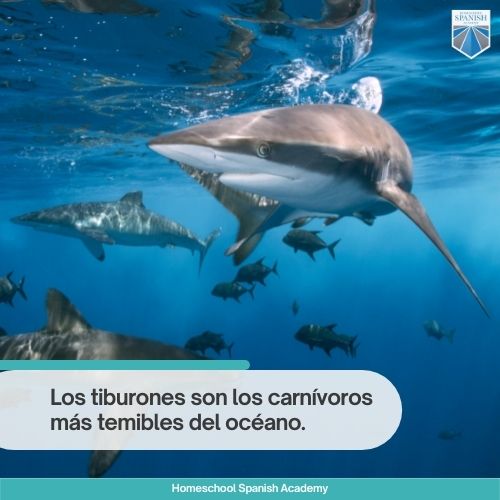
Los calamares gigantes son animales espeluznantes.
Giant squids are creepy animals.
Los cachorros de león son mimosos en sus primeros meses.
Lion cubs are cuddly in their first months.
Esa araña es peligrosa, te puede morder.
That spider is dangerous, it can bite you.
Los roedores son animales rápidos.
Rodents are fast little animals.
Los perezosos son animales super amables y mansos.
Sloths are super friendly and gentle animals.
Mi perro es muy glotón, nunca se llena.
My dog is highly gluttonous, he’s never full.
El jaguar es un animal feroz e intimidante.
The jaguar is a fierce and intimidating animal.
Los animales invertebrados no tienen columna vertebral.
Invertebrate animals don’t have a backbone.
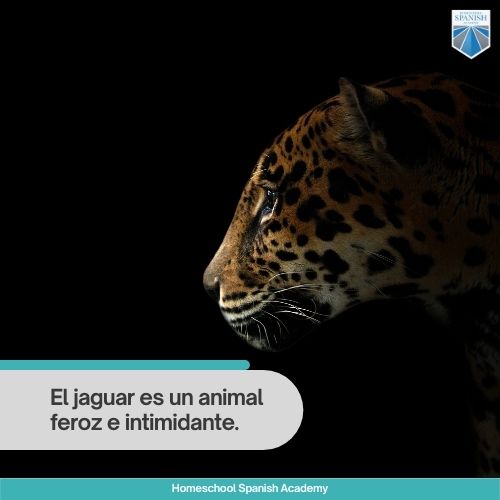
Discover the marvels and curiosities of spineless animals in this amusing Kid’s Guide to Invertebrate Animals.
Other Adjectives To Describe Animals Part 2
| English | Spanish |
| intelligent | inteligente |
| intuitive | intuitiva, intuitivo |
| mixed | mezclada, mezclado |
| omnivores | omnívora, omnívoro |
| poisonous | venenosa, venenoso |
| purebred | de pura raza |
| sassy | pícara, pícaro |
| scary | aterrador |
| shy | tímida, tímido |
| slow | lenta, lento |
| sneaky | sigilosa, sigiloso |
| spineless | sin espina dorsal, sin columna vertebral |
| vertebrate | vertebrada, vertebrado |
| wild | salvaje |
Example Sentences
Cuando los perros tienen cachorros actúan de forma intuitiva.
When dogs have puppies they act intuitive.
Mi gata es mezclada, no es de ninguna raza en particular.
My cat is mixed, she’s not of any particular breed.
Los animales que comen de todo son omnívoros.
Animals that eat everything are omnivores.
La rana punta de flecha es venenosa.
Dart frogs are poisonous.
Mi perro es un yorkshire terrier, es pura raza.
My dog is a Yorkshire Terrier, he’s purebred.
¡Que loro tan pícaro!
What a sassy parrot!
Las hienas son aterradoras.
Hyenas are terrifying.

Los pumas son animales tímidos.
Mountain lions are shy animals.
La tortuga es lenta.
The turtle is slow.
Las orcas son animales muy inteligentes.
Killer whales are highly intelligent animals.
Las culebras son sigilosas, no me gustan.
Snakes are sneaky, I don’t like them.
Los animales invertebrados son animales sin columna vertebral.
Invertebrate animals are spineless animals.
La zebra es un animal vertebrado.
The zebra is a vertebrate animal.
Ten cuidado, los osos son animales salvajes.
Be careful, bears are wild animals.

Explore The World of Vertebrate Animals in Spanish and learn all about the traits that make them unique and interesting.
Describing Specific Animals in Spanish
For building sentences with adjectives to describe animals in Spanish you use the verb “ser” or “estar” (to be).
These adjectives to describe animals follow the verb to be conjugated in its proper form and according to quantity (singular or plural) and gender. Keep in mind that some words that describe animals are gender-neutral and work both ways.
Refresh your knowledge on this essential verb with this Ser Conjugation: Free Lesson and PDF.
Examples
Las jirafas son altas y delgadas.
Giraffes are tall and thin.
El tiburón es aterrador.
The shark is terrifying.
See it in practice with these detailed paragraphs using Spanish adjectives to describe animals.
Spanish Adjectives To Describe a Lion
Los leones son animales salvajes que habitan en África. El león es un animal feroz y carnívoro. Los leones son peludos y los machos tienen melena. La leona es sigilosa y es rápida. Son animales grandes e intimidantes.
Lions are wild animals that live in Africa. The lion is a fierce and carnivore animal. Lions are furry and males have manes. The lioness is sneaky and fast. Both are large and intimidating animals.
Spanish Words To Describe a Cat
Mi gato es atigrado y pequeño. Es juguetón y travieso. Su nombre es Max. Es regordete y esponjoso. Es manso, se lleva bien con otros gatos y perros. También es dormilón y toma largas siestas. Es el gato más adorable que hay.
My cat is tabby and small. He is playful and naughty. His name is Max. He is chubby and fluffy. He is gentle, gets along with other cats and dogs. He is also a sleepyhead and takes long naps. He’s the most adorable cat ever.
Dog Adjectives List in Spanish
Mi perro se llama Rex. Es un animal cariñoso y peludo. Es mezclado, no es de ninguna raza en especial. Tiene el pelo rojizo y manchado. Es tierno, amigable e inteligente.
My dog’s name is Rex. He’s a loving and hairy animal. He’s mixed, he’s not any breed in particular. He has ginger and spotted hair. He’s cute, friendly, and intelligent.
Spanish Adjectives To Describe an Elephant
Los elefantes son animales enormes. Tienen la piel arrugada y áspera. Son muy inteligentes e intuitivos. Son vertebrados y herbívoros. Los elefantes solo comen plantas. Pueden ser agresivos si se sienten intimidados.
Elephants are enormous animals. They have wrinkly and coarse skin. They’re highly smart and intuitive. They’re vertebrates and herbivores. Elephants only feed on plants. They can be aggressive if they feel intimidated.
Spanish Words To Describe a Giraffe
La jirafa es un animal alto y delgado. Su piel está manchada y tiene colores claros. Es de los animales vertebrados más grandes que existen. Las jirafas bebés son tiernas y flacas. Son mis favoritas.
The giraffe is a tall and thin animal. Its skin is spotted and has light colors. It’s one of the largest vertebrate animals to exist. Baby giraffes are cute and skinny. They are my favorite.
What is your favorite animal? Choose from this massive list of 200+ Names of Animals in Spanish.
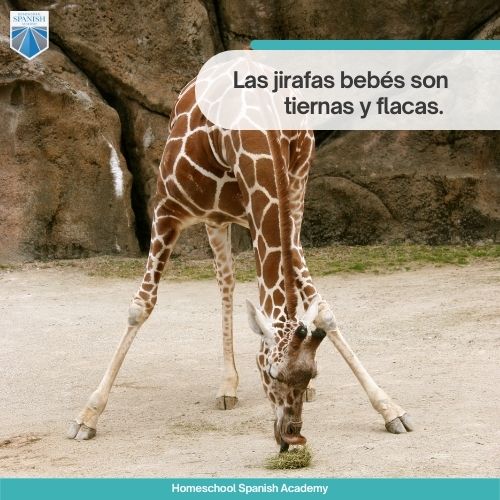
Describing Animal Habitats
Animals have fascinating characteristics that depend on their habitat. El hábitat de un animal (an animal’s habitat) and its qualities are what makes each animal unique, it shapes their appearance and behavior.
Let’s discover the different habitats and what adjectives to describe animals in Spanish you can use according to each one.
Check out this useful Guide to Desert Animals in Spanish.
Spanish Vocabulary To Describe Animal Habitats Part 1
| English | Spanish |
| aquatic | acuático, aquatica |
| burrow | la madriguera |
| cave | la cueva |
| cold | frío |
| coral reef | el arrecife de coral |
| creek | el arroyo |
| desert | el desierto |
| flying | volador, voladora |
| forest | el bosque |
| freshwater | el agua dulce |
| hole | el agujero |
| hot, warm | caliente |
| humid | húmedo |
Example Sentences
En los arroyos hay serpientes acuáticas que viven en agua dulce.
Creeks have aquatic snakes that live in freshwater.
Los zorros viven en pequeñas madrigueras en el bosque.
Foxes live in small burrows in the forest.
Algunos osos viven en cuevas calientes para protegerse del frío y la nieve.
Some bears live in warm caves to protect themselves from the cold and snow.
En el bosque hay algunos insectos voladores.
There are flying insects in the forest.
Las tortugas marinas comen en el arrecife de coral.
Sea turtles feed in coral reefs.
Los animales del desierto aguantan temperaturas calientes.
The animals of the desert can stand hot temperatures.
A los reptiles les gustan los agujeros húmedos.
Reptiles like humid holes.
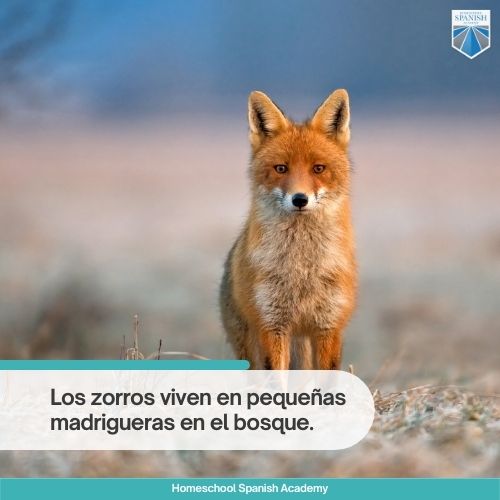
Spanish Vocabulary To Describe Animal Habitats Part 2
| English | Spanish |
| jungle | la jungla |
| mangrove | el manglar |
| mountain | la montaña |
| nest | el nido |
| ocean | el océano |
| prairie | la pradera |
| rainforest | el bosque tropical |
| savana | la sabana |
| swamp | el pantano |
| terrestrial | terrestre |
| tundra | la tundra |
| wetlands | los humedales |
Example Sentences
La jungla es húmeda e ideal para los anfibios.
The jungle is humid and ideal for amphibians.
Los halcones hacen sus nidos en las montañas.
Hawks make their nests in the mountains.
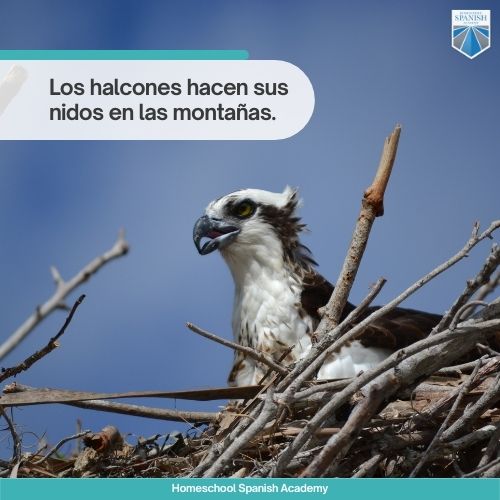
En el manglar encuentras animales acuáticos y terrestres.
In the mangrove you find terrestrial and aquatic animals.
Los osos polares de la tundra también nadan en las frías temperaturas del océano ártico.
The polar bears of the tundra also swim in the cold temperatures of the Arctic ocean.
Los venados se alimentan del pasto de la pradera.
Deer feed on the grass in the prairie.
En el bosque tropical hay muchos insectos y animales invertebrados.
In the tropical rainforest there are many insects and invertebrate animals.
Los cocodrilos habitan en los densos pantanos y humedales.
Crocodiles inhabit thick swamps and wetlands.
Take your knowledge of animals to the next level with this educational Spanish Study of Animal Habitats and Homes.
Discover More Adjectives To Describe Animals, People, and Places!
Visit your favorite zoo, sanctuary, or aquarium and take this lesson for a spin!
By now you’ve mastered how to use adjectives to describe animals like a native Spanish speaker. People who speak Spanish have infinite communication possibilities that allow them to connect with individuals from different parts of the world.
When you become bilingual you have a broader appreciation and respect of culture and diversity. Our wide variety of flexible Spanish programs are designed to take you straight to fluency.
At Homeschool Spanish Academy we have the best strategies and resources for language learners to spark the conversation. Skyrocket your Spanish by signing up for a free trial class with our certified teachers from Guatemala.

Join one of the 40,000 classes that we teach each month and you can experience results like these

“My Son, Heath, is taking the classes. He’s been with Luisa the entire time and we absolutely love her. She is always patient and is a great teacher. Heath’s dad speaks Spanish so they get to have little conversations.”
– William R, Parent of 3

“It’s great being able to interact with native speaking people and having a conversation with them not just doing all the work on paper. It’s also an amazing opportunity to speak with native Spanish-speaking people without having to travel to a native Spanish-speaking country.”
– Melanie

“It’s a great way to learn Spanish, from native Spanish speakers in a 1-on-1 environment. It’s been fairly easy to schedule classes around my daughter’s other classes. The best value for us has been ordering multiple classes at a time. All the instructors have been great!”
– Cindy D, Parent of 3
Ready to learn more Spanish vocabulary? Check these out!
- The 25 Most Useful Spanish Phrases You Need to Lear Today
- Top 20 Guatemalan Words and Slang Expressions You Should Know
- Bien vs Bueno: How Good is Your Spanish?
- How to Talk About Learning a Language in Spanish
- Señora vs Señorita: Who Is She?
- Learn These 20 Types of Fish in Spanish [+ More Vocab]
- 200+ Beginner Spanish Vocabulary Words PDF: Learn Spanish Fast!
- The Most Extensive Guide Ever to House Vocabulary in Spanish
- Doing Chores at Home (Free Spanish Lessons for Kids) - February 5, 2025
- 12 Contemporary Spanish Female Artists Who Will Empower You - January 16, 2025
- 29 Cool and Catchy Spanish Phrases To Use With Friends [+Audio] - January 8, 2023





